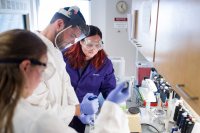
Bates takes part in premiere science education institute
Five members of the Bates College science faculty took part last August in an institute sponsored by the Association of American Colleges and Universities (AAC&U). The outcome of the five-day summer institute was a new national initiative called Science Education for New Civic Engagements and Responsibilities (SENCER).
In the Bates contingent were Rachel Austin, assistant professor of chemistry; three associate professors from the biology department, Pamela Baker, Lee Abrahamsen and Nancy Kleckner; and John Kelsey, professor of psychology. Bates was one of 29 colleges and universities to send a team to the institute, which took place at Santa Clara University, Santa Clara, Calif.
The SENCER Summer Institute was designed to support a national reform effort broadening the relevance of undergraduate science education. “The overall idea was that learning can be improved by connecting the teaching of science to current global issues, particularly those which are complex and largely unsolved,” says Pamela Baker.
“Many of the issues we face as citizens have a science or technology dimension,” Baker continues. “While not everyone can be an expert on everything, learning to be a critical thinker and knowing how scientfic knowledge is produced can help people contribute to these debates and decisions.”
Participants in the SENCER institute proposed courses that teach rigorous science content through problems that require scientific knowledge and expertise.
SENCER is planned as a five-year national dissemination project that will promote reform through faculty development, a focus on local systemic change and improved assessment strategies. The project is supported with a grant from the National Science Foundation and has three goals: 1) to improve science education, especially for students who will never major in a scientific field; 2) to connect science education reform to more robust and relevant general education programs; and 3) to stimulate informed civic engagement with scientific questions on the part of today’s students.
Divorcing scientific facts from the social context and the research methodology of the era in which they were discovered “makes it very difficult for people to apply those facts in the real world,” says Baker. “Making an effort to tie science education to real-life issues not only motivates students to learn the facts, but helps them learn to apply the scientific thinking process to issues they encounter in the future.”
She added, “It was gratifying to see that Bates is quite far ahead of many places in doing this kind of teaching.”
The Association of American Colleges and Universities is the leading national association devoted to advancing and strengthening liberal learning for all students, regardless of academic specialization or intended career. Founded in 1915, AAC&U has more than 700 accredited public and private colleges and universities of every type and size.



